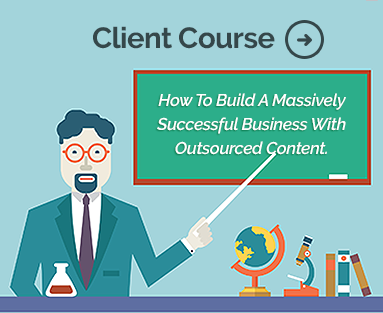As you’ve probably learned on your own by now, keywords are an essential part of every article you write. But before we even start today’s lesson I want to make one thing crystal clear- the quality of your writing is ALWAYS more important than how you use keywords in an article.
Now, that’s not to say that keywords are not important, but your client (and that client’s readers) will take a well-written article any day of the week over something that was perfectly optimized for the search engines. Realistically, you want to do both things- write a great article and make the primary keywords fit. But if you can only accomplish one thing, then focus on the quality of the content and engaging your readers. That’s always the most important aspect of writing online. With that out of the way, let’s start with the obvious question here- what is a keyword or a key phrase?
In essence, every single word you type qualifies as a keyword. Just so you know, people in this industry often use the term “keyword” to refer to a group of words- even though that is grammatically incorrect. For example, “How to Rent a Porsche 911 Turbo in Dallas, Texas” is actually a phrase, but some clients will refer to it as a keyword anyway. Others would call it a key-phrase or a long-tail keyword.
Let’s not get too hung up on definitions though- they all mean the exact same thing. A keyword is just a group of words that your client wants to rank for in the search engines.
The next thing you need to know about writing online is that search engines ignore the most basic words (terms like “the, and, but, or, than,” etc.) and then use everything else you type to figure out what your article is really about. And since computers can’t quite think like humans yet, it means that you have to be extremely careful when it comes to word choices.
Here’s how Google analyzes every article you write:
- First, it looks for the most commonly used words within your writing to figure out what the article is about in general.
- Then, it looks at the prominence of those keywords to decide what’s really important. Keywords used in a title, in the first paragraph, in quotes/bold or in a sub-title are seen as extra important.
- Next, the search engines compare your main keywords to see how they relate to each other. This gives even more focus on what the piece is really about.
- Finally, the search engines look at the complexity of your writing in general and how your keywords seem to fit for that particular topic.
Let’s work through a practical example and say that we are writing a 500 word article about “savings accounts” for a client.
As we just established, we would definitely use the key-phrase in our title for maximum brownie points with the search engines. But we would also want to try to use a few related words with a snappy title so it’s crystal clear what we’re actually writing about.
Bad Title – “How to Open a Savings Account”
Better Title – “An Investment Guide to Savings Accounts at a Local Bank”
Best Title- “Everything You Need to Know About Interest and Savings Accounts”
The third title is stronger than the others because it gets our keyword in there while mentioning “interest” as well, plus it delivers an actual promise with “Everything you need to know”. It also works because it would be attractive to all types of readers and the “you” makes it more personal.
The one I called the “better title”, on the other hand, is fairly well written. It sounds a little too formal though, which means young readers may not click on it if there’s other options. And remember- most adults already know a decent bit about savings accounts, so this topic would likely be for a younger audience.
On the one I said was a bad title, you can see that I dropped the “s” from the end of the keyword. Believe it or not, adding an “s” on the end of words will give so a completely different set of search results, so you always want to pay close attention to that.
Don’t believe me? Check for yourself real quick. Do a search for:
- Saving Account
- Savings Account
- Saving Accounts
- Savings Accounts
All four results are different because each is a different key-phrase.
Now, we would use all of those variations in our main article…but we would want the main key-phrase in the important areas since that’s the actual assignment.
The “bad title” is also just too generic to expect a strong response. We would only use that one if we were specifically instructed by the client (meaning that it was their exact long-tail keyword).
Let’s move on.
You also want to use your main keyword once or twice in your first paragraph (once for articles 500 words or less, and up to twice for longer ones), and then again about once every 100 words. As we discussed earlier though, please don’t take this as a rule set in stone- the quality of the writing is ALWAYS more important than how often you use your keywords.
Now, if you see that you’re using the main key-phrase way too often; then it is better to substitute similar phrases (like banking account, interest-bearing account, etc.) so the article has several different ways to rank. This also gives your writing more diversity and it will allow it to flow better.
Also, it would be very easy to over-use words like “banking” and “savings” in this type of article since it’s a big part of what you’re talking about. But if you do this by accident, then those incidental terms could end up being more prominent than your actual keywords…which could keep it from ranking at all.
So when I say to use a broad vocabulary and avoid repeating words; it goes for everything- not just keywords. Does that make sense?
Let’s wrap up a few loose ends before we close out this chapter.
Remember earlier how I mentioned the complexity of your article? Let’s talk about how that works. The search engines use a formula to determine how hard your article is to read, and you generally want to fall right in the middle of their scale. This would be around an 8th grade reading level.
What this means is, you don’t want your writing to feel too simple or too technical. So avoid using difficult words like deleterious (harmful) or remuneration (payment) and stick to common words instead. On the other hand, you don’t want to use a string of three and four letter words either…your job is to find the happy medium where everyone would feel comfortable.
And that, my friend, is essentially everything you need to know about keywords. I recommend that you go back and read this installment a few more times in the weeks ahead until it feels like common knowledge to you. Keywords are a very big deal in how often your client’s articles get found in the search engines, so mastering this information can literally make or break you as a writer.
Sincerely-
Keith Koons


 Previous Lesson
Previous Lesson



This is very informative, thank you
Good advice towards better writing
First of all, Keith, I have decided to come back to this article at least twice in the ensuing week. For it makes eminent sense. I have, at one go, learnt about the way search engines work and the importance of keywords or key phrase. But it should not be at the cost of the complexity and flow of the article. That thing, “Everything you need to know about banking and interest” gave me a clear idea. And that thing that the 500 word article is mainly for the young audience made me realize that we should always keep the kind of audience in mind while writing articles. Once again Thanks Keith.
Thanks you’d sent me this yesterday but it’s still of great vaiue
Great lesson. thank you.
Great, I have learnt how to create an excellent title, I have learnt that keywords should not be repeated in an article in other words one should use a range of various vocabularies as this will make your article ranked. Also check on the complexity of your work. Let it not be too simple or technical. One should always use simple words that is easier to understand.
Thanks for this important lesson
And I want to learn many more
Concise and to the point. Really helpful information. Thanks Keith.
I’ve really loved this.
Down to detail, informative and interesting read.
Thank you Keith…your help is going to be very rewarding…….
Thank you Keith…your intelligence is going to be very helpful in carving out this success if ever there is one….
I usually write well written political essays and ones about social issues. Is there a market for this ? Will this help me? I am a retired english teacher. I am more interested in creating readership more readership rather than income. Please respond to my e mail. I don’t know whether to start a blog or submit to on line magazines?
Thank you
Thank you so much for this easy to understand article!
I like the concurrency of words used in this chapter. They are simple to understand and in line with the topic at hand.
Thanks to Mr. Koons